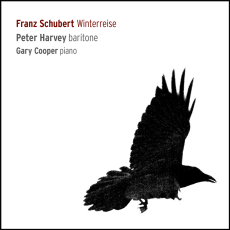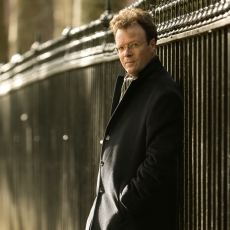Peter Harvey - Winterreise - Bay Area Reporter
What with winter travel having been the top of the news for weeks, it's fitting that a fine new recording of Schubert's Winterreise (Linn) (from the UK, no less) should appear. After the proverbial "heavy weather" Mark Padmore and Paul Lewis made of Schubert's greatest song cycle earlier this year (Harmonia Mundi), to raves from the obedient British press, bass-baritone Peter Harvey and fortepianist Gary Cooper, fellow Brits to be sure, have arrived to clear the air.
Like Padmore and Lewis, they have returned to original sources with the express wish of making music something like Schubert himself would have heard. Besides enlisting a Paul Winston copy of an 1832 Brodmann fortepiano - from the very decade in which Winterreise was composed - they've turned to a more historically sensitive performing style. Harvey, whose own translations of the 24 Wilhelm Mueller poems are used in the booklet, also provides a deeply insightful essay about the work and the pair's artistic intentions in performing it as they do. And to top it all off, Linn, which deservedly just won Gramophone's Label of the Year Award, presents the results in jaw-droppingly good, bell-clear sound.
If it did nothing more than show up the Padmore-Lewis - with its attention-seeking, harmony-grinding "Der Leiermann" at the end - for the hoax it is, it would be welcome. But it does something far more subtle and involving by moving through the music with integrity, devoid of such sensationalism. The music has rarely been laid out this plainly, its famous bareness the easier to appreciate. Theirs is a cycle that - from what seems dangerously like tinkling in the keyboard and preciousness in the delivery of the strophes of "Gute Nacht" - sneaks up on you.
If only the music-making had the derring-do of all the thought that went into it. In songs like "Der stuermische Morgen," Cooper makes the kinds of noises that prove that the fortepiano is no wimp, and Harvey distills some fine emotions from the text. But instead of rising to a great musical partnership, Cooper is definitely riding shotgun - and Harvey, having rightly become a near-hero in the early-music set for his astounding singing throughout the John Eliot Gardiner Bach Cantata Pilgrimage, does little more than prove that he has the chops to sing a killer Winterreise, maybe next time. Pretty much you wait in vain for the hair on the back of your neck to stand up, as it really should in a Winterreise that sounds like the one a reportedly shuddering Schubert played and sang for his friends when the ink had barely dried on the score.
Padmore, sans Lewis, followed up their CD with performances of a staged, Schubert-Samuel Beckett Winterreise that left even his admirers scratching their heads. Fellow Brits Simon Keenlyside and Ian Bostridge - who have both taken part in staged performances of Winterreise otherwise unadulterated - have made persuasive cases for the cycle as an extension of the British theater tradition. And they have not been alone in the relatively recent enterprise of turning the cycle into a psychodrama: Mr. Everyman-Nobody Goes to Hell. But there's a reason the first names that spring to mind when you think of great Winterreise interpretations are those of native German speakers.
That all sent me running back for another listen to the forgotten Winterreise of 2010, Harmonia Mundi's "other" Winterreise, with German tenor Werner Guera and Austrian foretpianist Christoph Berner. Its only flaw is that someone, perhaps in the design department, sneaked the dreaded (and incorrect) article Die into the work's title, though it doesn't appear after the booklet's title page. And, in another demerit for the art department, the cover boasts a Caspar David Friedrich painting that, while topical enough for Winterreise, is notably lacking in dread or Sehnsucht.
It hardly matters, since Guera and Berner supply the expression, abundantly yet with consummate taste. Theirs is a dynamic partnership start to finish, and there's never a sense of point-making of any kind about their utterly absorbing performance. There's a refreshing confidence, ease, and naturalness about their work (they've previously paired up for Schwanengesang), but not a casual, tossed-off note from either of them.
Berner's fortepiano, a Roenisch from 1872, is a vastly more colorful instrument than Cooper's, but of course it's the playing that matters, and Berner's is as brimming with character as is Guera's liquid tenor. You hear the menacing flapping of wings as the fateful crows make their first appearance, taking wing, in the opening of "Rueckblick" ("Backward Glance"), and Guera's horror at the apparition is palpable in his almost contortionist rendering of the text.
What this pair does as well as any since Britten-Pears is capture the shifts from naturalism to the supernatural that occur not only over the long arc of the cycle but within individual songs. They redefine aching beauty.


